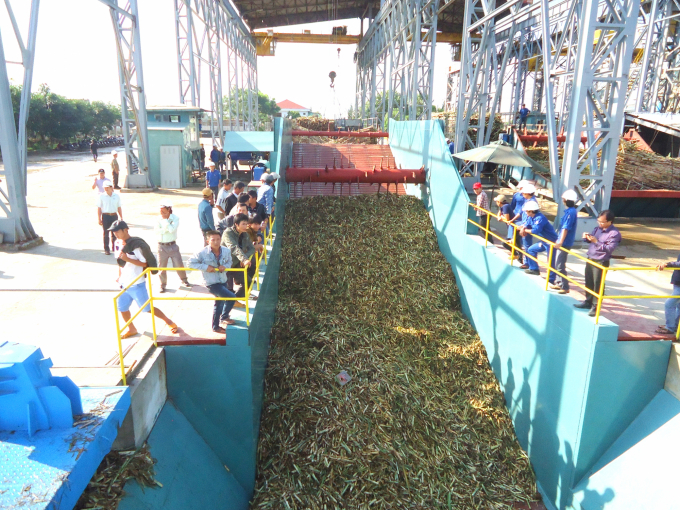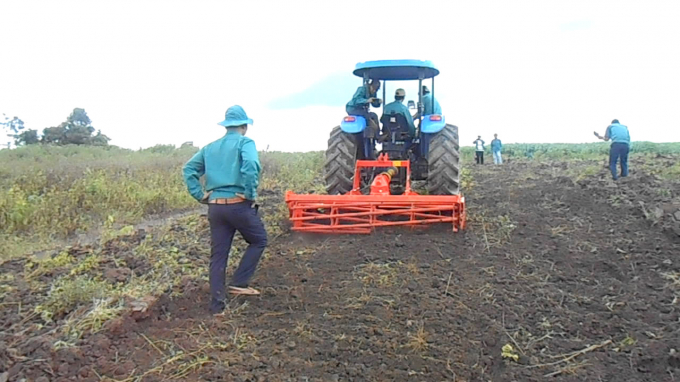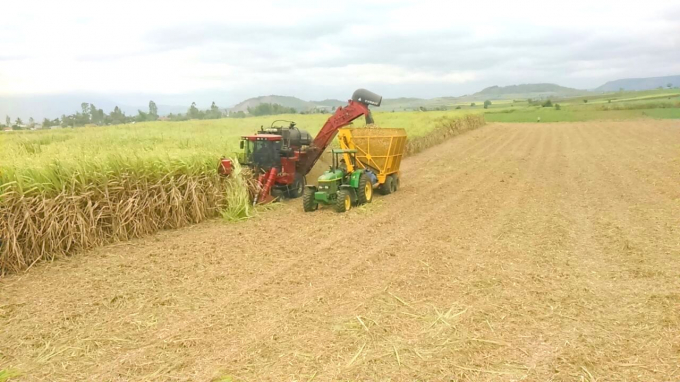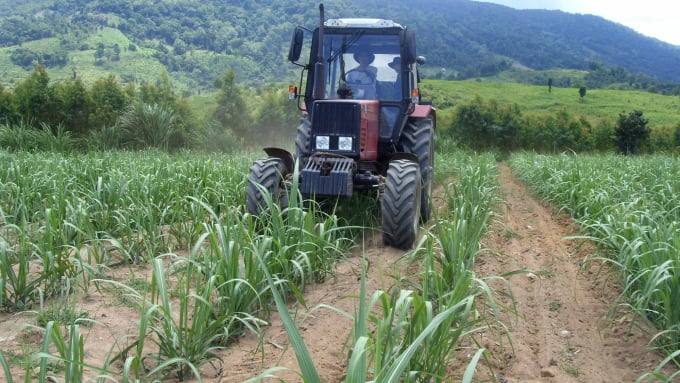May 21, 2025 | 04:46 GMT +7
May 21, 2025 | 04:46 GMT +7
Hotline: 0913.378.918
May 21, 2025 | 04:46 GMT +7
Hotline: 0913.378.918
Long-term price insurance for sugarcane growing area is at high level, making breakthroughs in plant varieties that are helping farmers return to grow sugarcane in the eastern part of Gia Lai Province.
Besides, breakthroughs in mechanisation and intensification of sugarcane also brings the farmer to grow sugarcane.
Nguyen Hoang Phuoc, Deputy Director in charge of raw materials for An Khe Sugar Factory, a subsidiary of Quang Ngai Sugar Joint Stock Company, said the factory has purchased 500,000 - 600,000 tonnes of sugarcane from local farmers in the eastern part of the province, including districts and towns of Kbang, Dak Po, and Kong Chro and An Khe so far.
The factory’s squeezing-sugarcane crop of 2021-2022, started from December 15, 2021 and is set to end on April 20, 2022.

An Khe Sugar Factory’s squeezing-sugarcane crop of 2021-2022 is set to end on April 20, 2022. Photo: V.D.T.
From the beginning of the crop, the factory has widely informed local farmers about the purchase price of raw sugarcane at VND1.05 million (USD 46) per tonne of 10CCS (commercial content sugar) sugarcane, about VND100,000 (USD 4.4) per tonne higher than the same period last year.
The factory has also supported sugarcane growers and traders with an average transportation cost of VND160,000 (USD 6.98) per tonne. Thus, the sugarcane will cost a total of more than VND1.2 million (USD52.3) per tonne when it reaches the factory.
Thanks to the increasing price of sugarcane, the local sugarcane growers have gained profits, so the sugarcane growing area in the eastern part of the province has been recovering strongly.
In this year crop, local growers have planted 6,000 ha of sugarcane, this is a positive signal for the factory to increase the growing area in the eastern part of the province to 30,000 ha as planned.
In addition to the high price of sugarcane, farmers also receive guarantee by the factory until 2025 at a price of VND900,000 (USD 39.2) per tonne.
While the amount of domestic sugar to serve domestic consumers is in short supply, the country has applied anti-dumping sugar measures to limit smuggled sugar, Phuoc said.
As a result, the domestic sugar price will remain stable for a long time, making the purchasing price of raw sugarcane also increasing accordingly, he added.
It is the bright prospect of sugarcane sector in the near future, he said.

Currently, all sugarcane-growing area in Kbang District have applied mechanisation of tillage. Photo: V.D.T.
“Thanks to the high price of sugarcane over the last two years, the support for transportation and the factory's easier method of purchasing sugarcane than before, sugarcane growers gain profits and feel very excited.
In the crop year of 2022 - 2023, people in Kbang District have planted about 1,000 ha of sugarcane, the areas where they previously switched to growing noodles and mulberries have now turned to grow sugarcane again. If the high price of sugarcane is stable in the coming years, the sugarcane area in Kbang district will recover strongly," said Ma Van Tinh, head of the district’s Department of Agriculture and Rural Development.
Determining varieties is the premise for the yield of sugarcane, the factory’s Sugarcane Seed Centre is constantly testing new varieties of sugarcane with drought tolerance, bringing high yield and high sugar content to transfer to local growers in order to increase profits for sugarcane growers.
When introducing new varieties that have been tested for mass planting, the factory invests money in breeding of sugarcane varieties to grow three varieties of Uthoong11, KK3, LK92-11 that costs about VND5 -10 million (USD 218-437) per ha.

Construction of large fields associated with mechanisation have helped lower costs, improving productivity and bringing profits for sugarcane growers. Photo: V.D.T.
"The amount of sugarcane varieties planted in the growing area helps the factory to proactively a source of seeds to new growers,” Phuoc said.
Thus, the average sugarcane yield in the growing area has gradually improved. It now has increased from 50 tonnes per ha to over 60 tonne per ha. The yield of sugarcane growing in large fields is even higher, reaching 80 tonnes per ha, he said.
The increase of sugarcane yield brings the income of sugarcane growers increasing, he said.
In recent years, mechanisation solutions have also been enthusiastically applied by sugarcane growers in the growing area. It is believed to be a way to help reduce costs and increase productivity for sugarcane.
In the 2011 - 2012 crop year, only more than 2,118 ha of sugarcane were invested by farmers to mechanise the stages of land preparation, planting and fertilising.
In the 2021 - 2022 crop year, the figure has grown to over 5,000 ha. The sugarcane growers realised the advantages of growing sugarcane by machines, so they boldly changed their traditional farming practices, therefore, the area of sugarcane growing by machines increased year by year.

Sugarcane in the growing area of the eastern part of Gia Lai Province is being cared by machines. Photo: V.D.T.
Phuoc said the factory has set up specific intensive farming solutions on sugarcane varieties, mechanisation, fertiliser and irrigation water in order to manage the growing area to supply the factory with 18,000 - 20,000 tonnes of sugarcane per day.

The average sugarcane yield in the growing area has continuously increased over the past time, reaching over 60 tonnes per ha. Photo: V.D.T.
The factory has focused on applying information technology to manage sugarcane fields to improve the efficiency of growing area management; promulgate mechanisms and policies on sugarcane propagation, policies on purchasing raw sugarcane according to each type of sugarcane variety in order to encourage growers to change towards an appropriate structure of sugarcane varieties; optimising production management, and minimising costs in each processing stage in order to lower the cost of sugar products and improve competitiveness in the market," Phuoc said.
Translated by Thu Hang

(VAN) Japan's grant aid project contributes to capacity building, promoting organic agricultural production, and fostering sustainable community development in Dong Thap province.

(VAN) For years, the CRISPR-Cas9 genome technology has been reshaping genetic engineering, a precision tool to transform everything from agriculture to medicine.

(VAN) Vietnam aims to become a 'leader' in the region in the capacity and managing effectively soil health and crop nutrition.
![Reducing emissions from rice fields: [Part 1] Farming clean rice together](https://t.ex-cdn.com/nongnghiepmoitruong.vn/608w/files/news/2025/05/05/z6509661417740_a647202949c539012a959e841c03e1d3-nongnghiep-143611.jpg)
(VAN) Growing clean rice helps reduce environmental pollution while increasing income, allowing farmers to feel secure in production and remain committed to their fields for the long term.
/2025/05/19/5136-1-144800_230.jpg)
(VAN) The Nghe An Provincial People's Committee has just approved the list of beneficiaries eligible for revenue from the Emission Reductions Payment Agreement (ERPA) in the North Central region for the year 2025.

(VAN) 14 out of 35 domesticated elephants in Dak Lak province have had their living conditions improved, with 11 of them currently participating in the non-riding elephant tourism model.

(VAN) Muong Nhe Nature Reserve hopes that being upgraded to a national park will lay the foundation for forest protection efforts to be carried out in a systematic, modern, and sustainable manner.